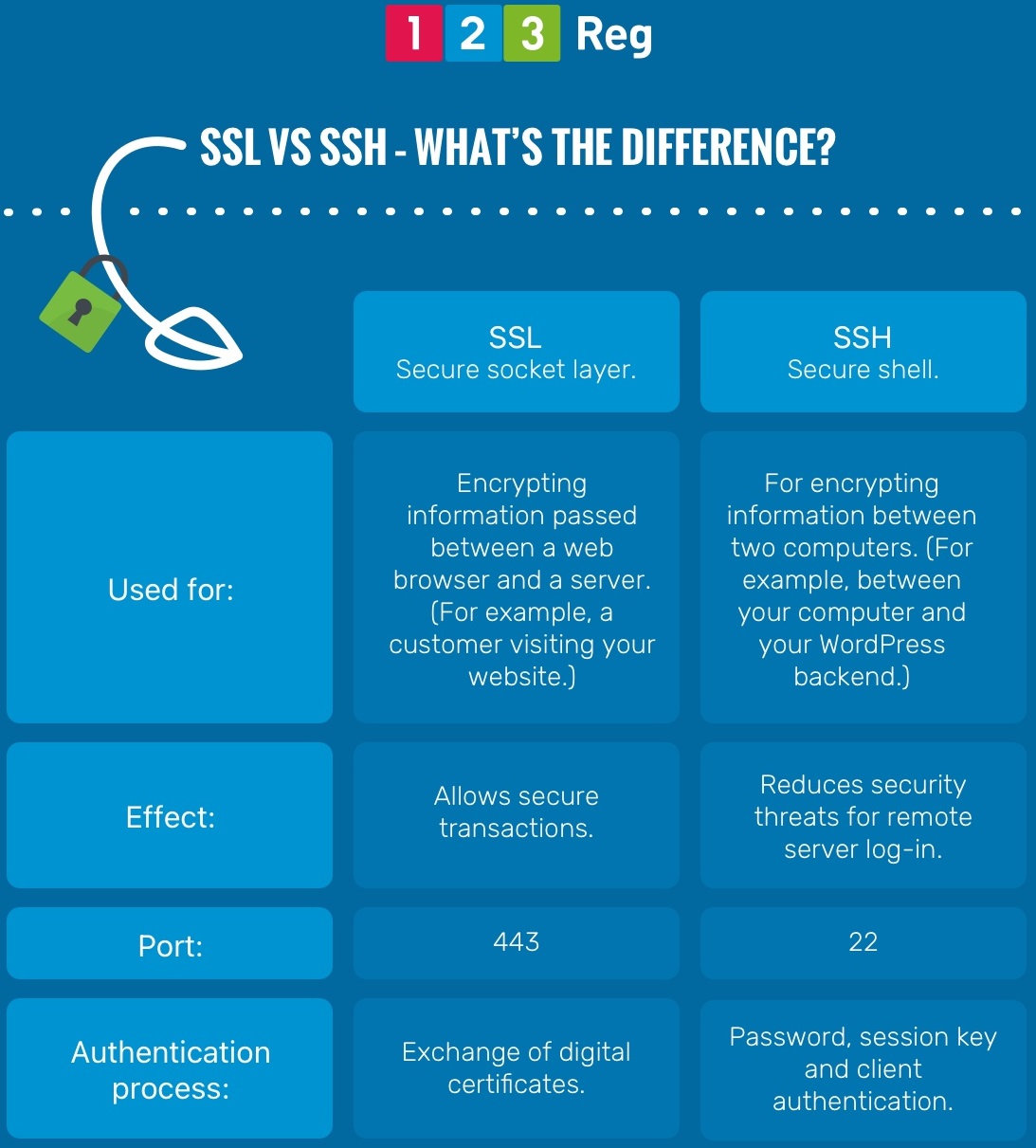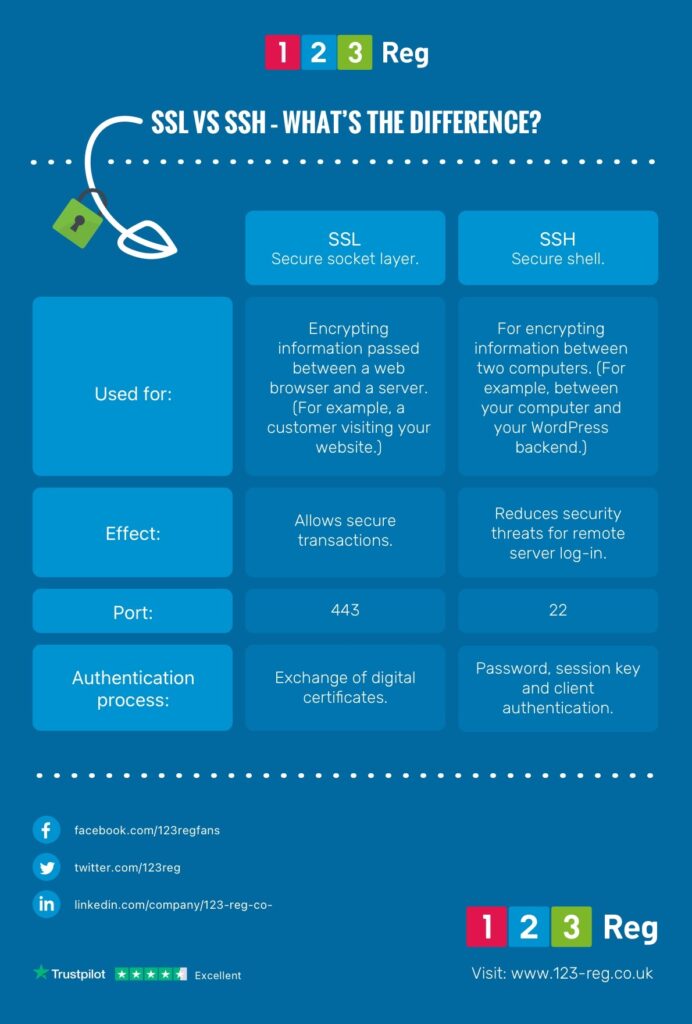Security Essentials Unpacked: A Guide to SSL and SSH
The world revolves around data — each and every click a piece of information. Security of that information is paramount. SSL and SSH are two of the most important weapons in the arsenal when it comes to keeping data secure on the web. While both work for our protection, they do so in very different ways.

The tech industry loves its acronyms and initials. So, let’s get this out the way to begin with: SSL stands for “Secure Socket Layer”, while the second set of letters — being the favourite of systems administrators and turtles alike — stand for “Secure Shell”.
Each one plays a huge role in keeping our data secure and making sure that people are who they say they are, online. But what exactly is the difference between the two?
Well, at a glance:
➤ SSL is used to: establish a secure connection between your web browsers and the websites you’re visiting. Specifically, we need to talk something called an SSL Certificate. These credentials are rather like digital passports, serving to confirm the identity of a website owner. Once checked, SSL Certificates go to work to hide data that’s being exchanged. This is important whenever we share sensitive info, such as credit card numbers. SSL Certificates are absolutely essential for all sorts of websites owners.
➤ SSH is used to: access and manage computers remotely. It offers a secure way to interact with servers so that a user can log in and executive commands from anywhere. This might also involve sensitive data, if not sensitive commands. Put simply, Secure Shell is a way for turtles — sorry, systems administrators — to securely access and manage systems from afar. And if you had to ask, you probably needn’t worry about it.

Key Similarities: Encryption
SSL and SSH both use encryption to keep information safe. That is, they both use algorithms to scramble up data so that it can’t be read by outsiders. SSL makes use of encryption to protect the data you share with websites. SSH uses encryption to be sure that when someone is accessing a computer or server from far away, no one else can take a look or interfere with what’s going on.
SSL and SSH both make use of “public” and “private” keys. That’s the key point (if you’ll excuse the pun): data is scrambled in such a way that’s impossible to decode given that nobody has access to both sets.
Needless to say, data without encryption is compromised more often. Only 56% of businesses fully encrypted their internet traffic in 2020. According to The World in Data Breaches Report by Varonis, as many as 7 million unencrypted data records are compromised every day.
SSL
What do SSL Certificates do?
You’ve surely seen it before — that little padlock symbol hanging out beside the address bar. If so, you probably have some vague sense of what SSL Certificates are about.
Imagine you’re doing some online shopping. With a basketful of items, you move on to the checkout page. There’s that padlock symbol. You may also notice that the “HTTP” part of a web address has changed to “HTTPS”. That extra ‘S’ stands for “Secure”. Users encounter SSL Certificates on a daily basis when browsing the web.
SSL Certificates establish a secure and encrypted connection between a client (like your web browser) and a server. Though digital, you can think of an SSL certificate much like you would a real paper credential, like a passport or an ID card, but for website owners. It all ensures the website you’re visiting is what it claims to be and not some fake site trying to trick you. You can shop in confidence because a safe connection has been established.
These certificates are controlled by a limited number of third parties. Known as Certificate Authorities, they work to make sure website owners’ details are legit. In fact, 96.3% of all SSL certificates online are issued by only 9 Certificate Authorities.
SSL Certificates were introduced in the mid-1990s and marked a real turning point in the history of the internet — especially online shopping. But they’re important for just about any sort of website that deal with sensitive info. Over time, SSL developed into TLS or “Transport Layer Security”. We still use the original expression to discuss the basic idea. Today, there are over 2.5 million SSL/TSL Certificates on the web.
Click here to learn more about securing your website with an SSL Certificate from 123 Reg.
SSH
What does Secure Shell do?
Secure Shell is a type of protocol that allows users to access and manage computers remotely and securely over the net. It’s mainly used by IT pros for remote server access, allowing them to login and manage servers from any location. Not everyone’s idea of fun. In fact, most of us will remain blissfully unaware.
Imagine, for instance, you’re a systems admin — sitting on a beach in Bali — and you want to access your website through an FTP Client (that’s the software that lets you manage it all from afar). You can use an SSH “tunnel” to established a connection between your local computer and the remote machine.

By using SFTP (the secure version of an FTP) you can guarantee your connection is encrypted. You are free to upload new files, carry out maintenance tasks, or perform any other task you please.
SSH makes use of certificates of sorts, too, but there are some additional steps involved. The encryption is like an onion with three layers. First, the Transport Layer creates a secure connection between the user and the server, keeping the shared data safe. Next, the Authentication Layer checks the user’s identity to ensure they have permission to access the server. Finally, the Connection Layer manages various types of communications over the secure channel.
To be sure, SSH is more than remote access, and it’s more than the VPN you might use to watch Australian reality television. Rather, it’s an uber-secure channel for remote management used mostly by professionals.
The Differences
When it gets down to it, SSL and SSH are really very different animals. SSL Certificates play their part during website interactions and transactions. They’re an everyday thing for all internet users. With the visual cue of the padlock and ‘HTTPS’ in the address bar, you want to know they’re there. Trustworthy website owners want you to see them, too.
SSH plays a background role. It’s a specialised tool. Whereas SSH creates a secure tunnel to transfer files and run commands, SSL securely transfers data, but doesn’t allow for the execution of commands in that way. Very technically speaking, SSL operates on port 443, whereas SSH works on port 22. We needn’t go into it, but imagine separate door numbers representing different entry points to the net.
Why do I need an SSL Certificate for my website?
✔ Protect User Data
Over 30,000 websites fall victim to hackers each and every day. One Gartner Report predicts 45% of all organisations worldwide will experience attacks by 2025 — up three times from 2021. SSL Certificates help keep user data safe by encrypting information such as passwords or credit card numbers.
✔ Prove Your Authenticity
As SSL certificates are regulated by Certificate Authorities, they show visitors (and potential customers) that your website is genuine. This is particularly important for new and small business owners trying to gain a foothold in a competitive market.
✔ Build Trust
SSL certificates show you’re working to protect your visitors. The padlock symbol and the ‘https’ help to build trust. As many as 85% of online customers go out of their way to avoid unsafe websites.
✔ Boost Conversions
SSL encourages visitors to engage, boosting a website’s conversion rate and turning casual visitors into active users or loyal customers.
✔ Be Payment Ready
SSL forms part of the Payment Card Industry Data Security Standard (PCI DSS). You’ll need it to receive payments.
✔ Improve SEO
Many search engines favour sites with SSL Certificates — placing you higher up the ranking. Google in fact goes out of its way to favour encrypted websites.
✔ Long-term Savings
Using SSL now might help you to avoid costly security slip-ups in the future. It’s an investment that ensures the safety of both customers and the business, preventing significant financial loss in the long run.
What’s a “Wildcard” SSL Certificate?
Wildcard SSL Certificates are very similar to regular SSL Certificates, in that they both secure your website for visitors to safely browse. The only difference is that, while regular certificates can only secure one domain, Wildcard certificates can secure the main domain as well as an unlimited number of subdomains, since they allow you to insert an asterisk before the domain name.
For example, a wildcard SSL Certificate that has been issued to *yourwebsite.co.uk can also secure subdomains such as “mail.yourwebsite.co.uk” and “store.coolexample.com”. Similarly, a wildcard SSL Certificate that has been issued to *.www.yourwebsite.co.uk can also secure subdomains such as mail.www.yourwebsite.co.uk and info.www.yourwebsite.co.uk.
The benefit of this is that you will save far more time and money than buying a separate SSL certificate for each subdomain.
Why do I need SSH (and… do I?)
For everyday internet users or small website owners, especially those using a good Website Builder or Managed WordPress Hosting, SSH isn’t a necessity. These services often handle the technical side of website management, keeping user interaction with SSH to a minimum.
Drilling down a bit into usage scenarios might make things clearer. There are a number of different uses for SSH, including:
✔ Remote Server Access
You can log in and make changes to servers from anywhere in the world, making it super handy for keeping websites and databases running smoothly.
✔ Remote Desktop
With SSH, you can see and control another computer as if you were sitting in front of it. This is useful when you need to use apps or access stuff that’s only available on that computer.
✔ Managing a WordPress Website
SSH can be used to manage WordPress websites remotely and securely. This can be useful for those working in teams who want more control over their websites. With SSH, WordPress owners can directly interact with the server, making it possible to run commands, manage files, and perform advanced tasks that aren’t possible through the WordPress dashboard.
See also: How Do I enable SSH for WordPress?
✔File Transfer
Using SSH helps you move files securely over the internet. It makes sure that your files, especially the confidential ones, don’t get seen by the wrong people during the transfer.
✔Network Management
SSH is important for making sure networks are running right. It lets you securely set up and check on network devices like routers and switches.
✔Software Development
For programmers, SSH is used to access the tools and code they need safely, making sure the software remains secure and private during development.
✔ Secure Tunnels
SSH can make safe, secret paths for information to travel through the internet. This is important for keeping your internet use private, especially when you’re on a public Wi-Fi network.
✔ Automated Backups
SSH helps set up regular, automatic backups of your data to different locations, ensuring your information is safe and sound, even if something goes wrong.
Security matters: In conclusion
Like two security guards each jingling their own sets of keys, SSL and SSH both help keep us secure. But they do so in very different ways. SSL Certificates show that a websites is real and can be trusted. They keep the private information we send online safe. And they’re something everyone on the internet needs to see. If you have your own website, especially one selling a products or services, they are key to building a trustworthy online presence. SSH, by contrast, is for the more technical people working behind the scenes. It offers a hands-on approach to server management from afar. While very different, SSL and SSH both play a huge part in keeping the internet safe and secure.
Click here for more information on how you can secure your website with an SSL Certificate from 123 Reg.

